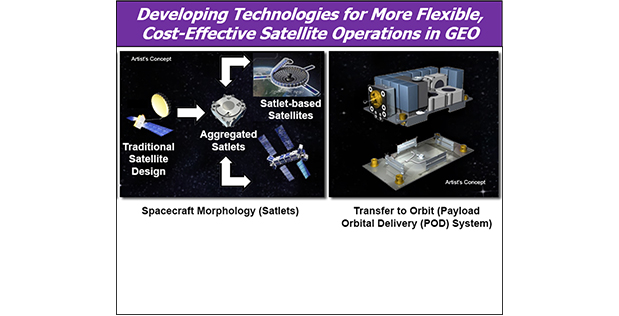
Developing New Satellite Assembly Architectures and Delivery Systems
The traditional process of designing, developing, building and deploying space systems is long, expensive and complex.
These difficulties apply especially to the increasing number of expensive, mission-critical satellites launched every year into geosynchronous Earth orbit (GEO), approximately 22,000 miles above the Earth.
Unlike objects in low Earth orbit (LEO), such as the Hubble Space Telescope, satellites in GEO are essentially unreachable with current technology.
The Phoenix program seeks to change this paradigm and reduce the cost of space-based systems by developing and demonstrating new satellite assembly architectures and delivery systems.
Phoenix is currently focusing on two primary technical areas of research:
- Satlets: A new low-cost, modular satellite architecture that can scale almost infinitely. Satlets are small independent modules (roughly 15 pounds/7 kg) that incorporate essential satellite functionality (power supplies, movement controls, sensors, etc.). Satlets share data, power and thermal management capabilities. They also physically aggregate (attach together) in different combinations that would provide capabilities to accomplish a range of diverse space missions with any type, size or shape payload. Because they are modular, they can be produced on an assembly line at low cost and integrated very quickly with different payloads. DARPA is presently focused on validating the technical concept of satlets in LEO.
- Payload Orbital Delivery (POD) system: The POD is a standardized mechanism designed to safely carry a wide variety of separable mass elements to orbit—including payloads, satlets and electronics—aboard commercial communications satellites. This approach would take advantage of the tempo and “hosted payloads” services that commercial satellites now provide while enabling lower-cost delivery to GEO.
The program envisions numerous benefits, including:
- Improved satellite usefulness, lifespan, resilience and reliability
- Lower satellite construction and deployment costs
Office
Tactical Technology OfficeThis program is now complete.
This content is available for reference purposes. This page is no longer maintained.
